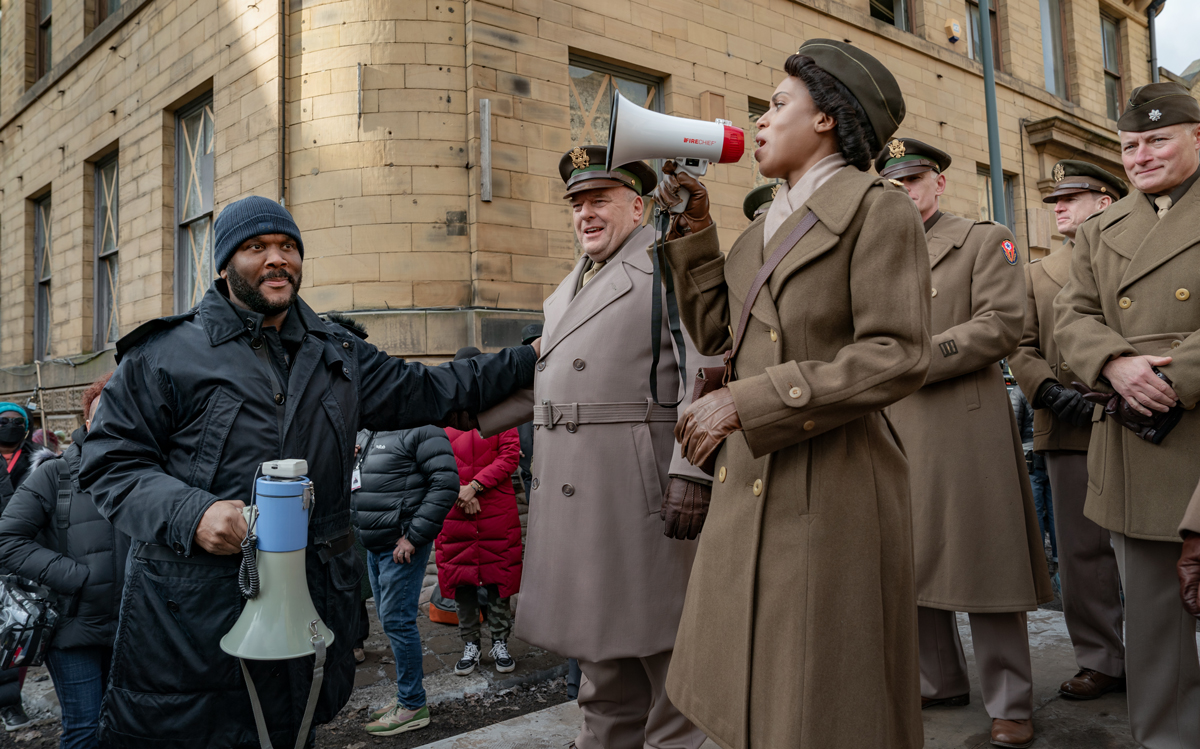
Photograph by Laura Radford/Perry Well Films 2/Courtesy of Netflix
When producer Nicole Avant approached Tyler Perry about the “Six Triple Eight,” the Atlanta-based filmmaker’s immediate reaction was one of shock. “I was like, Wait, is this story real?” Perry says.
The Six Triple Eight was an all-woman, majority-Black battalion in the Women’s Army Corps during World War II, which performed a crucial service in the war’s waning months. When the 885 women of the 6888th Battalion arrived in Birmingham, England, in February 1945, they were sent to a mail warehouse in utter disarray, filled with 2 million pieces of backlogged mail. The sacks, which reached the rafters, were filled with letters to U.S. troops from their families—their only form of communication with loved ones. Under the direction of Army Major Charity Adams, the soldiers turned the warehouse into a highly efficient mail distribution center, then did the same in Rouen, France. “No mail, low morale” was the motto of this extraordinary group, whose contributions to the American war effort largely went ignored until 2018, when they were honored with a monument at Fort Leavenworth in Kansas.
Perry saw the potential in the story, and also felt a responsibility to do it justice. He interviewed the few surviving members of the battalion, including Romay Davis and Lena Derriecott King, who were 103 and 99 at the time, respectively. “Their stories and recall were incredible,” says Perry. “There was so much emotion and humanity in what they said. That was my way into the story.” If he’d felt intimidated by making a World War II film, meeting members of the Six Triple Eight convinced him. “These women deserved to be honored,” Perry says. His script never strays far from the truth: “So many powerful things actually happened” to the battalion that were ripe for cinematic storytelling.
Right away, Perry set his sights on actress Kerry Washington for the role of Major Adams, the highest-ranking Black American woman to serve in the war, who fought virulent racism and sexism to lead her battalion’s effort. But Washington had one pressing question before she decided to sign on, Perry recalls. “She asked, ‘How do you write a story about mail?’”
Perry laughs—he’s spent the last few years answering that very question. “Thankfully I was able to explain the importance of the mail,” he says, “and how it was the only way for a soldier to communicate.” The cast mixes such stars as Washington, Oprah Winfrey, and Susan Sarandon with up-and-comers Ebony Obsidian and Shanice Shantay.
While some filming took place in Yorkshire, England, The Six Triple Eight, like most of Perry’s films, was primarily shot at Tyler Perry Studios in Atlanta, now approaching its 10th year at its home in the former Fort McPherson. “It’s such a historic landmark,” Perry says. “Honoring it and keeping it in pristine shape, that’s so important to me. I do my best to keep it maintained and celebrated because Atlanta is home for me. I’ve lived here longer than anywhere else.”
The city continues to shape and inspire Perry, too. “Moving here from New Orleans, seeing Black people do well—I saw it as a place I could thrive, too,” he says. “It continues to be that for me today.”
Perry is hopeful that The Six Triple Eight will inspire viewers to look for other seldom-heard stories of heroic efforts, especially since “so much of American history is still not being told,” he says. “This is the history of our country. We should all be celebrating it.”
In January 2024, Lena Derriecott King, who was born in Georgia—and who is portrayed in the film by Ebony Obsidian—passed away peacefully at the age of 100. But she had a chance to see a rough cut of Perry’s film before she died, and Perry says he feels lucky he had the chance to share it with her. “She laughed. She cried,” Perry says. “She told me, ‘Thank you so much for letting the world know Black women contributed to the war effort.’”
This article appears in our December 2024 issue.
Advertisement




